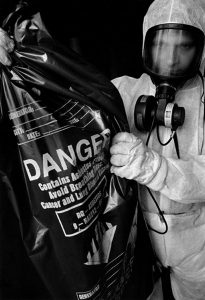 If you haven’t yet done so, it’s time to do so. And if you have done so, do it again: Contact your legislators about passing a budget that will protect workers.
If you haven’t yet done so, it’s time to do so. And if you have done so, do it again: Contact your legislators about passing a budget that will protect workers.
The House Appropriations Sub-Committee that deals with OSHA, MSHA and NIOSH is scheduled to mark up the FY 2018 Appropriations Bill on Thursday, July 13. A mark up is where they take the proposed bill and change language or add amendments before it’s voted on by the Full Committee, and then the full House of Representatives. Although we know what the Trump administration is proposing — eliminating worker training, safety and health research and independent chemical accident investigations — but we have no idea what the actual House bill says at this point. It could be better — or it could be worse than Trump’s proposal, and it could contain poison-pill amendments that would prohibit OSHA from enforcing its silica or record keeping standards.
What Do We Know About the Budget?
We have written before about what’s in President Trump’s budget proposal and it’s not good.
Occupational Safety and Health Administration (OSHA)
- The budget eliminates OSHA’s Worker Safety & Health Training Program: The OSHA Susan Harwood Grant training program has funded groups to train over one million U.S. workers on health and safety hazards and their rights at work, and has created hundreds of publicly available training materials in over a dozen languages.
- The budget will reduce OSHA’s enforcement staff by more than 10% from the 2016 level. It already takes OSHA, on average, 159 years to inspect every workplace in the country. (That means if Abraham Lincoln had started OSHA, it would not quite be finished inspecting every workplace in the country.
National Institute for Occupational Safety and Health (NIOSH)
Trump’s budget slashes the budget for the only agency that performs key scientific and application research that help workers, employers and state programs improve safety in the workplace.
- The budget eliminates Education Research Centers – training and research programs that focus on industrial hygiene, occupational health nursing, occupational medicine and occupational safety.
- Eliminates funding for expert research — on job safety; surveillance of lead poisoning, silicosis and other diseases; and NIOSH’s National Construction Center.
Mine Safety and Health Administration (MSHA)
- Trump’s budget increases coal miners’ risk of injury and death by cutting $3 million from MSHA’s budget and reducing the number of safety inspections in U.S. coal mines by nearly 25%.
Chemical Safety Board
- Trump’s budget eliminates the Chemical Safety Board, the only agency that performs independent chemical incident investigations: The Chemical Safety Board is a unique agency in charge of investigating major chemical incidents (explosions, leaks) independent of enforcement. CSB focuses on root cause analysis and preventing future major chemical incidents that affect workers and communities surrounding chemical plants. (The Chemical Safety Board budget is in a different committee than OSHA and will will be marked up on Wednesday.)
What Can You Do?

As we’ve said before, your Senators and Congresspersons will need to know that there can be no cuts in OSHA, MSHA or NIOSH. And if you live in a district or state with members on the Appropriations Committees, your voice is especially important.
- No funding cuts in OSHA, MSHA or NIOSH.
- 13 workers die every day in American workplaces.
- At current budget levels, OSHA can only inspect every workplace in the United States once every 159 years.
- A strong enforcement program is needed to ensure that low-road employers follow the law. This helps responsible employers – why should they be at a disadvantage competing with law-breakers?
- Mining continues to be one of the most dangerous occupations in the United States. Coal miners deserve protection.
- NIOSH performs needed research on best practices, new hazards and needed solutions that help map our way to improved injury and illness prevention
- Fund worker safety and health training — the Harwood Grants
- Harwood grants have trained more than 2.1 million workers in dangerous jobs since 1978.
- Harwood grants provide resources to non-profits (universities, unions, small business associations, worker rights groups) to provide hands-on training to small businesses and vulnerable workers.
- Evaluations have proven them effective in saving lives and preventing injuries and illnesses.
- The program is tiny: less than $11 million, or 0.0002 percent of the overall budget
- No poison pill riders that would block worker safety protections or rights. No riders on silica, injury reporting and anti-retaliation protections.
- Silica
- Silica causes cancer and serious lung disease.
- About 2.3 million workers are exposed to silica in their workplaces, including 2 million construction workers
- The Silica standard was issued a year ago and will save over 600 lives and prevent more than 900 new cases of silicosis each year.
- Many employers are already implementing the requirements
- Injury Reporting and anti-retaliation
- OSHA has delayed until December when covered employers would be required to send the summary of their workplace injury and illness logs to OSHA
- This information is important for workers and for employers to be able to compare their safety performance with other employers in their industry.
- OSHA may be reconsidering the parts of this regulation that forbid employers from retaliating against workers for reporting an injury or illness.
- Silica
Who Do I Contact?
Contact your Congressperson. If you live in any of the districts represented by members of the Appropriations Committee, it is especially important that you contact your members.
House of Representatives Labor, Health and Human Services and Related Agencies
Republicans
- Tom Cole, Oklahoma, Chairman
- Mike Simpson, Idaho
- Steve Womack, Arkansas, Vice Chair
- Chuck Fleischmann, Tennessee
- Andy Harris, MD, Maryland
- Martha Roby, Alabama
- Jaime Herrera Beutler, Washington
- John Moolenaar, Michigan
Democrats
- Rosa DeLauro, Connecticut, Ranking Member
- Lucille Roybal-Allard, California
- Barbara Lee, California
- Mark Pocan, Wisconsin
- Katherine Clark, Massachusetts
Thanks for every other informative blog. Where else may I am getting that type of info written in such a perfect approach? I’ve a challenge that I am just now working on, and I’ve been at the look out for such information.